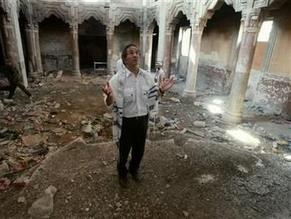|
World Jewish News

David Gerbi, a 56-year-old psychoanalyst who fled with his family to Italy at the age of 12, said he was facing discrimination and being ignored by Libya's new authorities in his efforts to reopen the Dar Bishi synagogue and gain recognition for Jews
|
Returning Libyan Jew says threatened over synagogue restoration
04.10.2011, Jews and Society A Libyan Jew who returned from exile as Moamer Kadhafi's regime fell said on Monday he is facing death threats over his attempts to restore Tripoli's abandoned and crumbling main synagogue.
David Gerbi, a 56-year-old psychoanalyst who fled with his family to Italy at the age of 12, said he was facing discrimination and being ignored by Libya's new authorities in his efforts to reopen the Dar Bishi synagogue and gain recognition for Jews who fled Libya during Kadhafi's rule.
"This already happened 44 years ago and now it's happening again," Gerbi, wearing a yarmulke on his head and Star of David pendant, said.
"They think they can make threats, that they are going to kill me, but I'm not going to give up. Like they did not give up to Kadhafi, I'm not going to give up to them."
Gerbi said he was told on Monday when he showed up to work at the synagogue that he would have to leave for his own safety.
A man claiming to represent the authorities told him his efforts were provoking anger in the country and that death threats had been made.
"He said 'there are many coming now, they are coming with guns, if they come you will be killed'," Gerbi said, adding that he had been told that a major demonstration against his efforts was being organised in Tripoli for Friday.
He left after four men armed with assault rifles showed up at the synagogue and its door was locked.
"I just wanted to clean the synagogue because I don't like to see it full of garbage, desecrated in the eyes of God," he said.
Gerbi said he had begun his efforts at the weekend, paying residents to help clean the temple, which is strewn with rubbish and covered in graffiti after decades of neglect.
He said the ruling National Transitional Council (NTC) needed to back his efforts to establish its democratic credentials.
"They need to say to these people: we are pluralistic," Gerbi said. "You want democracy, you want justice, you want pluralism, you want social rights, you need to take the whole package."
The Jewish community in Libya dates back to the third century BC and at its peak numbered about 38,000 people, although it was always the smallest of the Jewish populations in North Africa.
Most of the Jewish population left in the 20 years following World War II, mainly to Israel, where an estimated 180,000 Libyan Jews now live.
Several hundred were still living in the country during Kadhafi's coup of 1969, after which they were expelled and their property was confiscated.
Gerbi said he had returned to Libya this summer to help with the revolution and was hoping to become a member of the NTC representing the Jewish community.
He said he had met senior NTC officials but was frustrated that he had not yet been recognized as a member of the council.
"They are forming the government. Why am I not part of the picture, why do I have to excluded?" he asked, speaking in English.
"I am waiting for the answer to be a member of the NTC. Why others yes and I have to be the last on the list?"
Gerbi said he understood that Kadhafi's regime had left a legacy of anti-Semitism and that, like in much of the Arab world, animosity towards Israel runs deep in Libya.
But he said Libyans would need to accept his efforts to prove the country really had changed after Kadhafi.
"They said they wanted justice, they wanted freedom, they wanted democracy. This is the time to prove it."
He said he did not know when it would be safe for him to return to the synagogue and resume his work.
"I'm not here to play hero, I don't want to play martyr," Gerbi said. "I just want to be here to support the new Libya and democracy."
EJP
|
|
